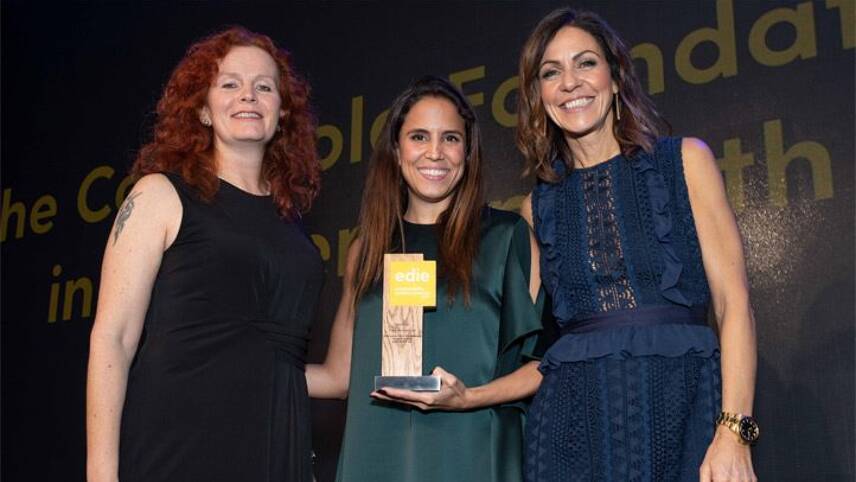Register for free and continue reading
Join our growing army of changemakers and get unlimited access to our premium content

Eshcon director Anya Ledwith (left) and compere Julia Bradbury (right) present the award
A 2018 study by the European Environmental Agency (EEA) found that just 40% of rivers and lakes across the continent meet minimum ecological standards for habitat degradation and pollution – with the UK one of the worst-performing nations. As such, there is a responsibility for corporates to extend water stewardship activities beyond simply using less water.
Coca-Cola and charity WWF have been working together since 2012 on a project to provide a thriving future for English rivers. The scheme involves working with farmers on scaling up water-sensitive farming to restore chalk streams and aid agricultural supply chain sustainability in East Anglia, where a high proportion of the UK’s sugar beet is grown. The project engaged with more than 2,500 farmers to deliver sustainable practices, resulting in more than 3,600 acres of land being farmed more sustainably. Additionally, this led to improved soil and water quality. In total, more than 1.5 billion litres of water had been replenished by the start of 2020.
Coca-Cola has now gone beyond water efficiency and made major global commitments to water stewardship: to reduce the impact on the freshwater environment; be ‘water neutral’, and source main agricultural ingredients sustainably. Coca-Cola Great
Britain and WWF-UK have been working together with the Rivers Trust to increase the reach of its work on freshwater by engaging hard to reach farmers at the grassroots level.
In 2018, the partnership launched a three-year programme to aid supply chain sustainability, while protecting England’s rivers and streams. The English Rivers Replenish Programme is working in two large areas – or river catchments – in East Anglia. These areas include some of the UK’s most precious wildlife habitats and rivers that flow into the Norfolk Broads – one of the UK’s National Parks. Most chalk streams and other rivers in the area are failing to meet good ecological status due to diffuse pollution and sediment run-off from agricultural production, as well as over-abstraction. The partnership, working closely with The Rivers Trust, supports farmers in these two catchments to improve the way they manage their land and reduce the impacts of production on the freshwater environment. In turn, improved practices aid the resilience of agricultural supply chains.
In addition to direct action to promote water-sensitive farming, the partnership has demonstrated collaborative and innovative water management that has inspired other stakeholders to take action – such as Tesco. Using its water-sensitive farming work to showcase good practice, the partnership demonstrates and encourages collective action between the “golden triangle” of civil society, business and government. To expand its impact, the work has instigated an upscaling of water stewardship across East Anglia and nationally.
Within a community-led approach, engaging people and groups across society to deliver improvements at a river catchment scale, it has established the Water Stewardship Service. The service helps businesses work together to deliver sustainable solutions for water to accelerate the change required to save rivers and streams. In particular, one area of delivery has been supporting farmers to install silt traps. These traps are seasonal or permanent ponds that capture agricultural run-off from surrounding fields. They enable soil carried by the run-off to settle out before cleaner water discharges to adjacent rivers. The benefits are multiple: farm chemicals, including
phosphate fertiliser, are prevented from entering the rivers; the sediment load of rivers is reduced -creating better fish-spawning habitats; captured silt can be excavated and returned to fields.
The partners believe that managed properly, there can be enough water to meet the needs of both people and nature. To achieve this, businesses, governments,NGOs and communities all need to play their part. The partnership between WWF UK and Coca Cola Great Britain is an important step on that journey.
What edie’s judges said: “This project addresses both water quality issues and water stress. The results of the project are measured and reported in-depth, proving that it has affected thousands of farmers indirectly. Moreover, there are opportunities to learn from the scheme and to replicate it.”
Are you our next winner?
Now entering their 14th year for 2021, the RSA-accredited Sustainability Leaders Awards are a unique opportunity to shout about the achievements you and your company have made during this challenging year.
Entries have now closed for the award scheme. In a digital event on Wednesday 3 February 2021, entrants will get the chance to celebrate virtually with leaders from across the sustainability, CSR and energy space. Some exciting new categories have been added for 2021 to recognise excellence across the spectrum of sustainable business.
— REGISTER TO ATTEND THE 2021 SUSTAINABILITY LEADERS AWARDS HERE —
edie Staff


Please login or Register to leave a comment.